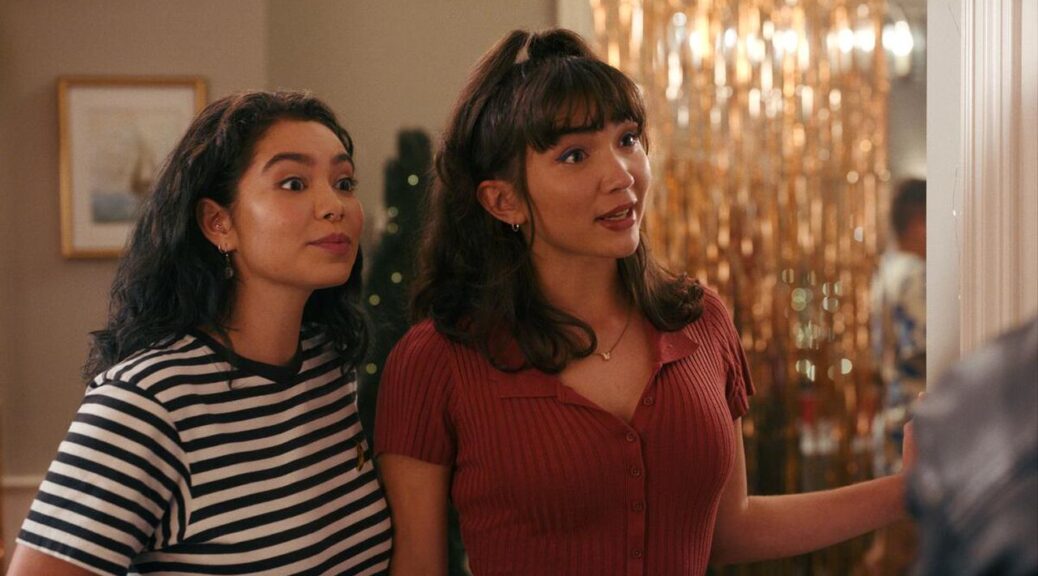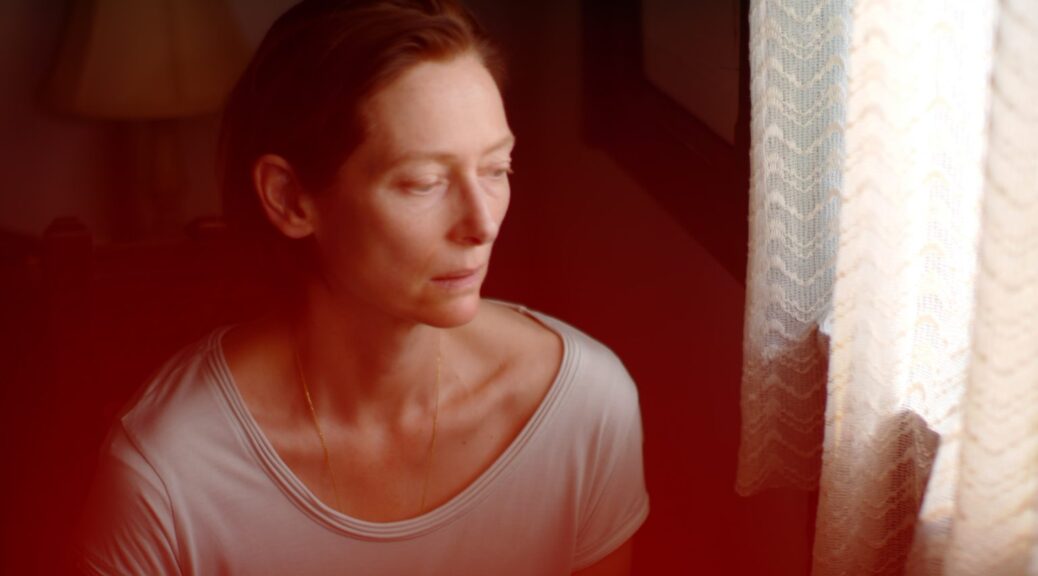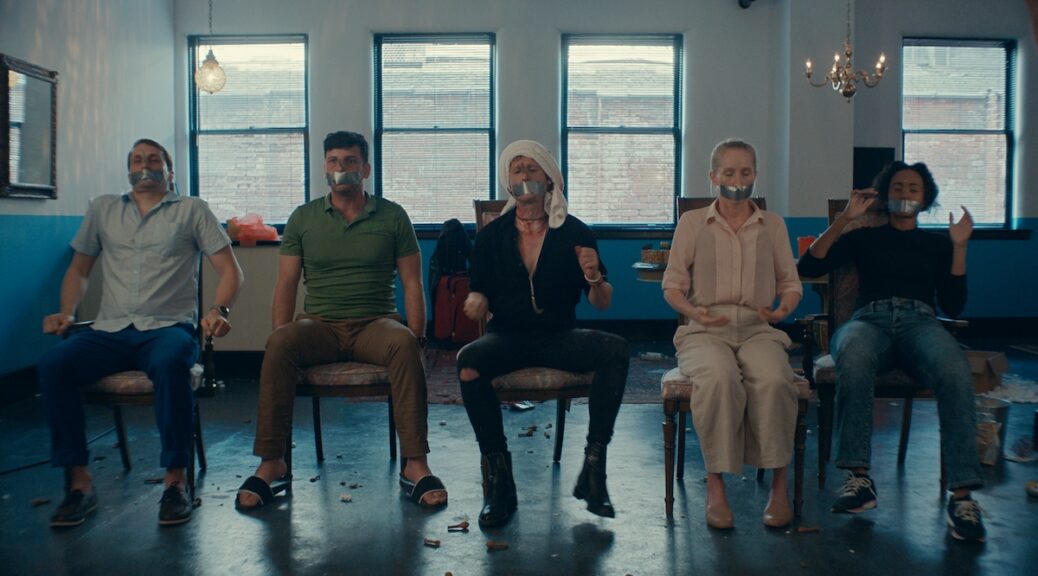Monthly Archives: April 2022
Kissing to Be Clever
Crush
by George Wolf
Don’t worry, parents, the high schoolers in Hulu’s Crush don’t play Seven Minutes in Heaven anymore.
“That perpetuates a Christian narrative. We’re playing Seven Minutes in a Hotel Bathroom.”
Noted. So while the hormones here are as active as ever, the cage they’re raging in is awash in idealized hipness, as a trio of newbie filmmakers craft a feature debut full of genuine sweetness and winning humor.
Paige (Rowan Blanchard from TV’s Snowpiercer) is a Junior at Miller High, and being gay is the least of her drama right now. She’s struggling with the application to Cal Arts – her dream school – and she can’t find the courage to make a move on Gabby (Isabella Ferreira) – her dream girl.
That’s not all. Miller’s Ren Fest-loving principal (Michelle Buteau – a hoot) thinks Paige is behind the series of artful school vandalism murals signed by the mysterious “King Pun.” To avoid suspension, Paige agrees to become extracurricular active (Gabby runs track, so…) and work on outing the real vandal (king pun intended).
But just when it seems Gabby is interested, Paige can’t quit thinking about another track teammate (Auli’i Cravalho, voice of Moana) who never seemed like her type.
Until now.
Director Sammi Cohen invites us into an upper-middle-class teenage dream where kids are accepted and their choices are trusted. None of the stakes or the heartbreaks feel particularly dramatic, but the film itself finds resonance in being purposefully sanitized.
Screenwriters Kirsten King and Casey Rackham develop a nice groove that is self-aware without any awkward pandering to the teen audience. There are plenty of wink-winks to the formula they’re upending, and while the film is never as authentically sexual as last year’s Plan B, the occasional bawdy zinger does land.
Both Blanchard and Cravalho are irresistible charmers, with scene-stealing honors split between Megan Mullaly as Paige’s Mom (“Don’t take edibles before school, we talked about this”) and Aasif Mandvi as the track coach (“I know 60 percent of you are queer!”)
Wait, are Mom and Coach talking dirty to each other? OMGLOL!
Underneath all the horniness is a feel-good formula that may remind you of last year’s Oscar-winning CODA. But the emphasis in Crush showcases a high school world where the queer kids drive that formula. The film itself becomes a 90-minute safe space, where kids can just stress about their crushes instead of the reaction to whatever gender they may be crushing on.
Free as a Bird
The Aviary
by Hope Madden
The pandemic — as crushing and debilitating as it was for so many people — also showed us how resilient people could be. Nowhere is that clearer than with art and, in particular, filmmaking.
To continue to create, filmmakers had to get creative in ways they may not have in the past. They limited themselves to small casts, tight locations, small crews — nothing terribly new to low-budget indie filmmakers. Sometimes that sparked something excellent, like Roshan Sethi’s 7 Days.
But there’s no room for weakness when an audience’s attention is focused so narrowly. Here’s where Chris Cullardi and Jennifer Raite’s mindbender The Aviary comes up short.
Malin Akerman and Lorenza Izzo are two friends escaping Seth (Chris Messina) and Skylight, a cult in the New Mexican desert. Each woman comes at the journey and the decision to break from their confines a bit differently. As the escape grows more and more complicated and terrifying, those differences breed distrust.
Akerman’s solid if uninspired as the more rugged and world-wise Jillian, once a high-ranking member of the organization. She lured Blair (Izzo) into the fold and now feels responsible to get her safely away.
Izzo’s performance stands out a bit more, ranging from shellshock to paranoia to mania as the journey wears on.
At its high points, The Aviary becomes a potent allegory for toxic relationships. Messina is particularly effective, his take on the cult leader somehow more insidious for its sincerity and tenderness.
Cullari and Raite, who co-write and co-direct, don’t have anything especially fresh to say, though. Their writing is fine, never exceptional. Their ideas are solid enough, not innovative by any means. The direction works but never excites.
That obviously leads to a palatable if forgettable cinematic experience. Worse though, it draws attention to flaws because there’s not much else to focus on. The film’s twists feel lazy, illogical rather than surprising. The disappointing payoff turns a relatively bland journey into an unfortunate slog.
Reconnecting
Unplugging
by Rachel Willis
When his UPS delivery driver unexpectedly dies, Dan (Matt Walsh) decides it’s time he and his wife “unplug” and reconnect with each other.
With Unplugging, co-written by Walsh and Brad Morris, director Debra Neil-Fisher attempts to find humor in a couple so plugged-in that a weekend without cell service becomes a disastrous nightmare.
The premise of the movie is applicable to plenty of people. Who doesn’t know someone who’s practically married to their phone? In this case, that’s Dan’s wife, Jeanine (Eva Longoria). The demands of her office are such that she’s typing emails and sending Jib Jabs at 3 am.
Dan and Jeanine’s daughter is just as connected as Jeanine, but this is apparently not a problem. Dan’s tech-free weekend getaway is just for Mom and Dad. His daughter, still looking at her phone as she says goodbye to her parents, is left behind with her grandmother.
Walsh and Longoria are adept at comedy, but the script never gives them anything to work with. Gil (Keith David) runs the local place where the only thing worth eating is the enchiladas, but the spot is so dead that Dan and Jeanine are his only customers. At least, until Perkins (Lea Thompson) shows up.
Thompson and David also have a knack for comedy, but David is underutilized, and Thompson’s drone-tracking, government-conspiracy-spouting rural nut is too over-the-top to land any jokes. Neither character make a lot of sense in the grand scheme of things, except to criticize rural people as “out there.” Perkins’s pet raccoon Lulu only belabors this point.
The film is unclear about its message. Is tech a bad thing? Or is it okay in moderation? Does getting lost in the woods make you appreciate your tech more, or less? Will a person’s constant disconnection from the “real” world make them suspicious of their neighbors? Or are your neighbors worthy of your suspicion? (If they live in the country, the answer seems to be yes.)
Like its characters, Unplugging gets lost about halfway through and never finds its way back. That it’s light on the humor only makes it harder for those of us who unplugged to watch the movie to keep our hands off our phones.
Days of Future Past
Memoria
by Hope Madden
If you are in the mood for something decidedly different, let Apichatpong Weerasethakul’s meditative wonder Memoria beguile you. Or bewilder you. Or both.
You won’t be alone. Indeed, you’ll be much like Jessica (Tilda Swinton, perfect, of course). She’s awakened one dawn by a sound, a kind of “bong” that’s impossible to ignore. She assumes construction in a nearby building is to blame, but eventually, this sound follows her wherever she goes.
A desperate yet somewhat resigned curiosity drives Jessica to try to place the noise, or to identify its cause, whether natural or supernatural.
Her journey unfolds in gorgeously unconventional and profoundly cinematic fashion. Weerasethakul’s approach is simultaneously deliberate and dreamlike, and his tale rejects simplification or, indeed, proper summarization. It certainly avoids that comforting Hollywood structure, but Memoria offers a meticulous structure of its own, one that feels vague but supports the spell being cast.
The film becomes a mystery of sorts, but one that dredges up more questions than answers. On the filmmaker’s mind seems to be concepts of collective memory and isolation, sensory experience and existence.
Jessica’s travels through Colombia in search of answers becomes an entrancing odyssey. Akritchalerm Kalayanamitr’s sound design heightens the experience, almost becoming a second character in the way that the sound supports Swinton’s performance.
And what a performance. Quiet and precise as if always listening and careful not to disturb, Swinton once again disappears wholly into a role.
No fan of simple solutions to life’s puzzles, Weerasethakul still leaves the story with an enigmatic but astonishing resolution. The spell he and his lead cast while bringing you to those final moments offers an experience more surprising and unique than anything else you’ll find onscreen this year.
Screening Room: The Northman, Massive Talent, The Bad Guys & More
Practical Magic
Marvelous and the Black Hole
by Hope Madden
Anybody who remembers Cheers knows Rhea Perlman can be tough as nails. But a magician hoping to befriend an angry adolescent? Well, that’s just masochism.
Still, that is the plot of Kate Tsang’s Marvelous and the Black Hole. Sullen Sammy (Miya Cech) is in trouble again. Her widowed father (Leonardo Nam) doesn’t know what to do with her, but the vandalism and angry outbursts — especially toward his new love, Marianne (Paulina Lule) — have got to stop.
The ultimatum: get an A in a summer course at community college or go to a religious boot camp.
But the course on entrepreneurship is lame and the teacher’s a moron so Sammy hits the bathrooms for a smoke. There she runs afoul of Perlman’s Margot, on campus to entertain a preschool. Margot sees something of herself in Sammy. Slowly, reluctantly, they pull friendship out of a hat.
Tsang’s got a history with whimsy, which certainly informs her feature debut. Animation, fantasy and magic spill together in sometimes inspired, sometimes ill-fitting ways to highlight Sammy’s tumultuous coming of age.
There’s an interesting clash of visual styles, but beneath that is a uniformly predictable story. Situations and characters are too broadly drawn, but just when you’re tempted to give up on the film, Tsang and gang hit a note of authenticity that pulls you back in. That’s particularly true with the way the film deals with grief.
What elevates Tsang’s tale no matter the scene is Cech’s performance. She anchors the story with a believably angry girl trapped between the tantrums of childhood and the self-destruction of adolescence. The performance feels authentic rather than angsty and it elevates even the weakest scenes.
Perlman’s a charmer as the lonely mentor and she and Cech share a sweet chemistry. The film boasts some laughs and some cringes, but uneven as it gets, Cech delivers.
From the Land of the Ice and Snow
The Northman
by Hope Madden
Robert Eggers releases his third feature this week, a Viking adventure on an epic scale called The Northman.
You had me at Robert Eggers.
On display once again are the filmmaker’s aesthetic instincts, his mastery of framing, and his ability to squeeze every ounce of brutal beauty from a scene. This film is gorgeous, simultaneously broadcasting the wonder and unconquerable ruggedness of its Nordic land and seascapes.
There are also familiar faces. Anya-Taylor Joy plays Olga, a spoil of war too cunning to remain long in bonds. She’s joined in smaller roles by Eggers favorites Ralph Ineson, Kate Dickie, and Willem Dafoe as a wizened court jester.
Now, if you’re not a fan of the director’s two previous features, 2015’s The Witch and 2019’s The Lighthouse, that does not necessarily predict your feelings about his latest effort. Eggers is working in a different genre with a different, far larger cast and scope this time around.
Alexander Skarsgård is the film’s titular hero; Claes Bang, his uncle and foe.
What you have is a classic vengeance tale: prince witnesses royal betrayal and the murder of his father. He loses his mother and his crown and vows revenge. You’ve seen the trailer.
I will avenge you, father.
I will save you, mother.
I will kill you, Fjolnir.
Skarsgård is cut to play a Viking. His performance is primarily physical: blind rage looking for an outlet. He’s believably vicious, bloodthirsty, single-minded and, when necessary, vulnerable. The entire cast around him is equally convincing.
Nicole Kidman – who played Skarsgård’s wife in the HBO series Big Little Lies, graduates to mother here, while Ethan Hawke plays his father, King Aurvandil War-Raven.
That’s a good name.
Oh, plus Bjork because Iceland. In fact, Egger’s co-writer here, beloved Icelandic novelist and screenwriter Sjón, penned not only last year’s gorgeous folk horror The Lamb, but also Bjork’s early work with Lars von Trier, Dancer in the Dark.
Classic is exactly how The Northman feels. The story is gritty and grand, the action brutal and the storytelling majestic. As is the case with Eggers, expect a fair amount of the supernatural and surreal to seep in here and there, but not enough to outweigh the meticulously crafted period realism.
Platinum Status
Stanleyville
by George Wolf
Every once in a while, a film comes along that has no hope of fitting inside those “every once in a while” constraints.
Because if you’re looking to sum up Stanleyville in such generic terms, good luck to you.
It’s a weird movie. Which is not necessarily a bad thing.
In his feature debut, director and co-writer Maxwell McCabe-Lokos serves up an offbeat comedy that is equal parts exaggerated and restrained, one that’s anchored by the quiet existential dread of Maria (Susanne Wuest from Goodnight Mommy).
Startled by a hawk flying into her office window – and the lack of a reaction from her co-worker – Maria walks off away from her job, her family and the few material things she’s carrying with her. Slumped and staring blankly ahead from a massage chair at the local mall, Maria’s approached by older gentleman in an ill-fitting suit. Oh, and his name is Homunculus (Julian Richings).
What’s this? Maria’s been chosen from among “hundred of millions of candidates” to compete in a contest. And not just any contest, a “platinum level exclusive contest!”
The prize: a brand new habanero-orange compact SUV.
Maria’s in, and she reports for duty to find four other contestants (with names like Bofill Pancreas and Manny Jumpcannon) ready to battle for that sweet habanero ride. As Homunculus explains the ten rounds of competition (“Uh, there’s only eight up there.”), check that – eight rounds of competition, contrasts are drawn between Maria and her opponents.
She’s up against a hedge fund d-bag, a muscle bound jock, the fame whore and the badass bitch. McCabe-Lokos fits all four into clearly purposeful stereotypes, while Maria is reserved and harder to read.
The eight rounds are bizarre and abstract, with the microcosm of society breaking down along familiar lines as desperation grows to get the grand prize, along with the validation of conquering “the very essence of mind-body articulation.”
The brand of satire is indeed fascinating and ambitious, it’s just never more than dryly clever. Even at barely 90 minutes, a sense of drag seeps into the film, and though McCabe-Lokos shows definite promise for the future, Stanleyville hits the final bell more of a curiosity than a champion.
Ch-ch-ch-ch Changes
We’re All Going to the World’s Fair
by Brandon Thomas
It’s hard to imagine any filmmaker creating something exciting and fresh inside of the found footage subgenre in the year 2022. Since The Blair Witch Project burst onto the scene over 20 years ago, found footage has touched on haunted houses, monster invasions and even alien abductions. Honestly, if you name it, there’s probably been a found footage movie made about it. In We’re All Going to the World’s Fair, director Jane Schoenbrun dials back the visual trickery, and instead crafts something much more intimate, yet equally terrifying.
Anna Cobb is Casey, an isolated teen who has become obsessed with an online role-playing horror game. Dividing her time between her attic bedroom, the detached garage on her property, and the nearby woods, Casey begins to document what she thinks are changes to her body and mind due to the game.
Schoenbrun allows many scenes to play out in long, uninterrupted takes. Whether it’s Casey talking to the camera, or a static shot of her sleeping, this approach wrings the tension out of even the most mundane. We’re always waiting for something to happen. Sometimes it does. Sometimes it doesn’t. The not-knowing is the worst.
We’re All Going to the World’s Fair also cleverly plays with form. Schoenbrun isn’t afraid to leave found footage behind and take a more traditional narrative approach. The filmmaker still expertly keeps the movie tapped into the immense isolation Casey and her online friend JLB (Michael J. Rogers) feel. Outside of other online testimonials, Casey and JLB are the only two characters we clearly see in the entire film.
There’s always the question of whether what’s happening to Casey is real or just a byproduct of internet obsession. It’s easy to point to this young character and say, “See! Teens are soooo addicted to the internet,” yet, the film wisely juxtaposes Casey with JLB and his equally monotonous existence. The film leaves so many tantalizing questions dangling, but any answers offered up would never satisfy the ones in our head.
We’re All Going to the World’s Fair plays with theme and character much more than it does with on-screen carnage. However, it doesn’t take shadows dancing in the corner of the frame to create chills and thrills.













